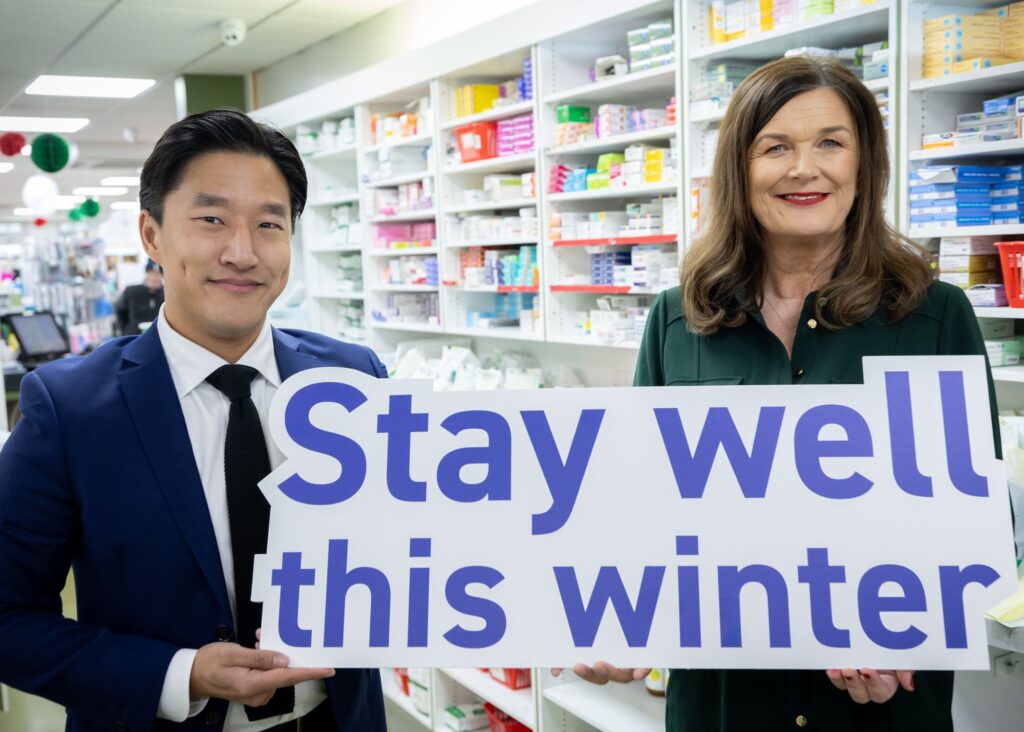Community pharmacies across Northern Ireland are providing advice and support to help people look after their mental health in a new campaign.
Running throughout February and March, the “Look after your mental health” campaign is part of the Living Well initiative, a partnership between the Public Health Agency (PHA), Community Pharmacy NI (CPNI) and the Department of Health (DoH), providing public health advice in over 500 pharmacies.
The campaign highlights the importance of small daily actions to benefit your mental health and wellbeing, being aware of any signs of problems, and using self-care techniques to manage your mental health.
Kathy Owens, Health and Social Wellbeing Improvement Manager at the PHA, said: “Common mental health problems such as anxiety, stress, low mood and depression can affect anyone. While these feelings can be a natural response to life’s challenges, they can become more serious if we don’t do something to help improve our mental health.
“The latest Living Well campaign highlights the importance of looking after our mental health and recognising the signs of poor mental health, and highlights actions we can take to improve our mental health and how to get help if needed.”
In Northern Ireland, at any given time, one in five adults will be experiencing mental ill-health. Mental health is shaped by the wide-ranging characteristics of the social, economic and physical environments in which people live. Looking after our mental health is not something we should just do when we are feeling down, it’s something we should proactively maintain just like our physical health.
Justin Crozier, Community Pharmacist at Toome Pharmacy in Co Antrim, said: “Pharmacists are well positioned in the community to offer advice and support about different health matters that may arise. We are usually seen as helping people deal with physical ailments, so it is important that through this Living Well campaign the public are aware that their mental health and wellbeing is just as important to us. I’d encourage anyone calling in to their local pharmacy to pick up a leaflet and ask staff a bit more about the initiative and where to seek further advice and support.”
Further information on how to improve your mental health and a list of services that can provide mental health support is also available at www.mindingyourhead.info
To learn more about the signs of poor mental health, what you can do to improve it and how to get help if you need it, pick up a free ‘Look after your mental health’ leaflet in your local participating community pharmacy. If you need help and support, speak to a member of the pharmacy team.
The campaign will also promote the ‘Take 5 steps to wellbeing’ as a guide to help people practise self-care.
The ‘Take 5 steps to wellbeing’ are: Connect, Keep Learning, Be Active, Take Notice and Give.
‘Take 5 steps to wellbeing’:
Connect – Connect with the people around you: family, friends, colleagues, neighbours, work, school or in your local community. Think of these relationships as the cornerstones of your life and spend time developing them. Building these connections will support and enrich you every day.
Keep learning
Don’t be afraid to try something new, rediscover an old hobby or sign up for a course. Take on a different responsibility, fix a bike, learn to play an instrument or how to cook your favourite food.
Set a challenge you will enjoy. Learning new things will make you more confident, as well as being fun to do.
Be active
Go for a walk or run, cycle, play a game, garden or dance. Exercising makes you feel good. Most importantly, discover a physical activity that you enjoy; one that suits your level of mobility and fitness.
Take notice
Stop, pause, or take a moment to look around you. What can you see, feel, smell or even taste? Look for beautiful, new, unusual or extraordinary things in your everyday life and think about how that makes you feel.
Give
Do something nice for a friend, colleague, or stranger, thank someone, smile, volunteer your time or consider joining a community group. Look out as well as in. Seeing yourself and your happiness linked to the wider community can be incredibly rewarding and will create connections with the people around you.
Kathy concluded: “Everyone can benefit from the ‘Take 5 steps to wellbeing’. If we can build these in to our daily routine, we will soon start to see the mental health benefits and improvements to our overall wellbeing. It will help us to engage our minds, be more active and connect with others. Take 5 will start to become part of our lives and, if you are already practising them, then encourage others to try them out and feel the benefits too.”
People can and do recover from mental health problems.
If you or someone you know is in distress or crisis, you can call Lifeline and speak to a trained counsellor 24/7. Call 0808 808 8000.
If you or someone else is in immediate danger of suicide or you require urgent medical attention, call 999.
Notes to editors
In Northern Ireland, at any given time, one in five adults will be experiencing mental ill-health. (Health Survey NI 2019/2020) – www.health-ni.gov.uk/publications/health-survey-northern-ireland-first-results-201920
You can get help from your GP or use the service directory on Minding your head to look for a service that meets your needs. Visit www.mindingyourhead.info/finding-help
To find out more about the ‘Take 5 steps to Wellbeing’ visit www.mindingyourhead.info/Take5
To find out more about Lifeline visit www.lifelinehelpline.info





